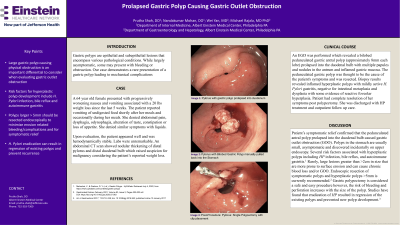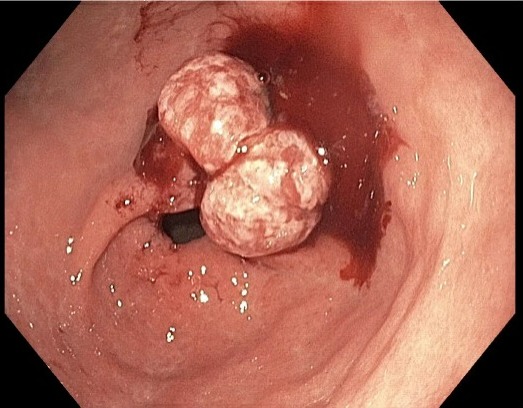Back


Poster Session D - Tuesday Morning
Category: Stomach
D0731 - Prolapsed Gastric Polyp Causing Gastric Outlet Obstruction
Tuesday, October 25, 2022
10:00 AM – 12:00 PM ET
Location: Crown Ballroom

Has Audio
.jpg)
Prutha Shah, DO
Albert Einstein Medical Center
Philadelphia, PA
Presenting Author(s)
Prutha Shah, DO, Nandakumar Mohan, DO, Wei Yan, MD, Michael Rajala, MD, PhD
Albert Einstein Medical Center, Philadelphia, PA
Introduction: Gastric polyps are epithelial and subepithelial lesions that encompass various pathological conditions. While largely asymptomatic, some may present with bleeding or obstruction. Our case demonstrates a rare presentation of a gastric polyp leading to mechanical complications.
Case Description/Methods: A 64 year old female presented with progressively worsening nausea and vomiting associated with a 20 lbs weight loss since the last 5 weeks. The patient reported vomiting of undigested food shortly after her meals and occasionally during her meals. She denied abdominal pain, dysphagia, odynophagia, alteration of taste, constipation or loss of appetite. She denied similar symptoms with liquids. Upon evaluation, the patient appeared well and was hemodynamically stable. Labs were unremarkable. An abdominal CT scan showed nodular thickening of distal pylorus and distal duodenal bulb which raised suspicion for malignancy considering the patient’s reported weight loss. An EGD was performed which revealed a bilobed pedunculated gastric antral polyp (approximately 8mm each lobe) prolapsed into the duodenal bulb with multiple papules and nodules in the antrum and inflamed gastric mucosa. The pedunculated gastric polyp was thought to be the cause of the patient's symptoms and was resected. Biopsy results revealed inflamed hyperplastic polyps with mildly active H. Pylori gastritis, negative for intestinal metaplasia and dysplasia with some evidence of reactive foveolar hyperplasia. The patient had complete resolution of her symptoms post polypectomy. She was discharged with HP treatment and outpatient follow up care.
Discussion: The patient’s symptomatic relief confirmed that the pedunculated antral polyp prolapsed into the duodenal bulb causing gastric outlet obstruction (GOO). Polyps in the stomach are usually small, asymptomatic and discovered incidentally on upper endoscopy. Several risk factors are associated with hyperplastic polyps including HP infection, bile reflux, and autoimmune gastritis. Rarely, large lesions greater than >2cm in size that are more prone to surface erosion and can cause chronic blood loss and/or GOO. Endoscopic resection of symptomatic polyps and hyperplastic polyps >5mm is currently recommended. Gastric polypectomy is considered a safe and easy procedure however, the risk of bleeding and perforation increases with the polyp size. Studies have found that eradication of HP resulted in regression of the existing polyps and prevented new polyp development.

Disclosures:
Prutha Shah, DO, Nandakumar Mohan, DO, Wei Yan, MD, Michael Rajala, MD, PhD. D0731 - Prolapsed Gastric Polyp Causing Gastric Outlet Obstruction, ACG 2022 Annual Scientific Meeting Abstracts. Charlotte, NC: American College of Gastroenterology.
Albert Einstein Medical Center, Philadelphia, PA
Introduction: Gastric polyps are epithelial and subepithelial lesions that encompass various pathological conditions. While largely asymptomatic, some may present with bleeding or obstruction. Our case demonstrates a rare presentation of a gastric polyp leading to mechanical complications.
Case Description/Methods: A 64 year old female presented with progressively worsening nausea and vomiting associated with a 20 lbs weight loss since the last 5 weeks. The patient reported vomiting of undigested food shortly after her meals and occasionally during her meals. She denied abdominal pain, dysphagia, odynophagia, alteration of taste, constipation or loss of appetite. She denied similar symptoms with liquids. Upon evaluation, the patient appeared well and was hemodynamically stable. Labs were unremarkable. An abdominal CT scan showed nodular thickening of distal pylorus and distal duodenal bulb which raised suspicion for malignancy considering the patient’s reported weight loss. An EGD was performed which revealed a bilobed pedunculated gastric antral polyp (approximately 8mm each lobe) prolapsed into the duodenal bulb with multiple papules and nodules in the antrum and inflamed gastric mucosa. The pedunculated gastric polyp was thought to be the cause of the patient's symptoms and was resected. Biopsy results revealed inflamed hyperplastic polyps with mildly active H. Pylori gastritis, negative for intestinal metaplasia and dysplasia with some evidence of reactive foveolar hyperplasia. The patient had complete resolution of her symptoms post polypectomy. She was discharged with HP treatment and outpatient follow up care.
Discussion: The patient’s symptomatic relief confirmed that the pedunculated antral polyp prolapsed into the duodenal bulb causing gastric outlet obstruction (GOO). Polyps in the stomach are usually small, asymptomatic and discovered incidentally on upper endoscopy. Several risk factors are associated with hyperplastic polyps including HP infection, bile reflux, and autoimmune gastritis. Rarely, large lesions greater than >2cm in size that are more prone to surface erosion and can cause chronic blood loss and/or GOO. Endoscopic resection of symptomatic polyps and hyperplastic polyps >5mm is currently recommended. Gastric polypectomy is considered a safe and easy procedure however, the risk of bleeding and perforation increases with the polyp size. Studies have found that eradication of HP resulted in regression of the existing polyps and prevented new polyp development.

Figure: Pylorus with bilobed gastric polyp manually pulled back into the stomach.
Disclosures:
Prutha Shah indicated no relevant financial relationships.
Nandakumar Mohan indicated no relevant financial relationships.
Wei Yan indicated no relevant financial relationships.
Michael Rajala indicated no relevant financial relationships.
Prutha Shah, DO, Nandakumar Mohan, DO, Wei Yan, MD, Michael Rajala, MD, PhD. D0731 - Prolapsed Gastric Polyp Causing Gastric Outlet Obstruction, ACG 2022 Annual Scientific Meeting Abstracts. Charlotte, NC: American College of Gastroenterology.
